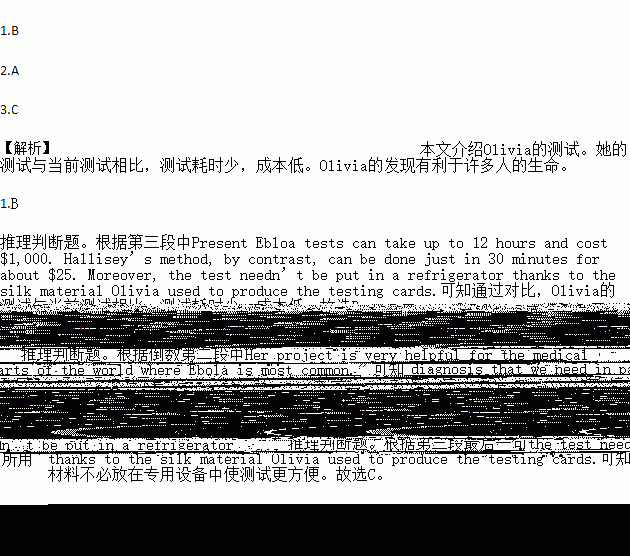题目内容
Does a 16-year-old have the ability to change the world, benefiting hundreds of thousands of people?
Olivia Hallisey should believe so. With her invention of new Ebloa test, the girl from US has become the winner of the 2015 Google Science Fair, a yearly competition for creative teenagers who want to make a difference in the world.
Hallisey’s method asks patients to put a sample of their saliva (唾液)onto a testing card. The card changes color if the person is infected with Ebloa. Present Ebloa tests can take up to 12 hours and cost $1,000. Hallisey’s method, by contrast, can be done just in 30 minutes for about $25. Moreover, the test needn’t be put in a refrigerator thanks to the silk material Olivia used to produce the testing cards.
Hallisey started working on the test one year ago when she saw Ebloa spreading across African countries. Her research was based on looking at and using previous research and her own creative ideas.
“She deserves all the praise she’s getting for her hard work, dedication, and intelligence,” said her science teacher Andrew. “Her project is very helpful for the medical diagnosis that we need in parts of the world where Ebola is most common.”
“What affects one country affects everyone,” Hallisey told CNBC. “We have to work together to find answers to the challenges that threaten global health, our environment and our world.”
1.According to the article, Olivia’s tests .
A. use a person’s saliva, which is sorted at a low temperature
B. are less time-consuming and less expensive than current tests
C. are less time-consuming but more expensive than current tests
D. show changes in the color of blood if the person is infected
2.Which of the fo llowing statements is TRUE?
A. Olivia’s discovery could benefit the lives of many people.
B. Olivia’s research was based on her own creative ideas.
C. Olivia set her mind on winning the 2015 Google Science Fair.
D. Olivia’s research began before the outbreak of Ebloa in Africa.
3.What quality makes the test more convenient?
A. The material used can easily be produced in Africa.
B. The material used is easier to store in a refrigerator.
C. The material used needn’t be put in a special device.
D. The material used is common in the places where Ebloa is most comm on.
 黄冈天天练口算题卡系列答案
黄冈天天练口算题卡系列答案





